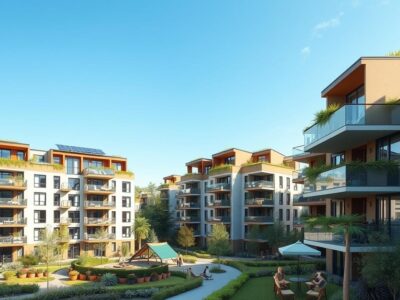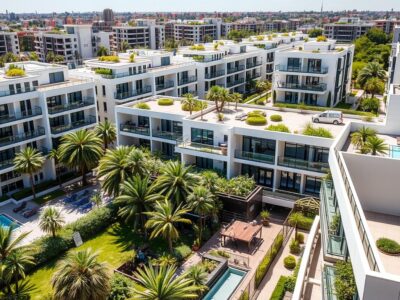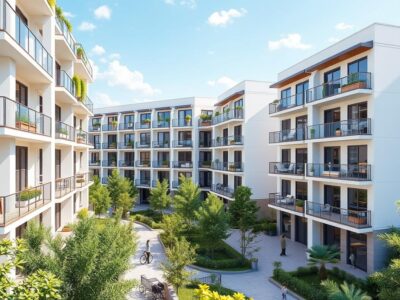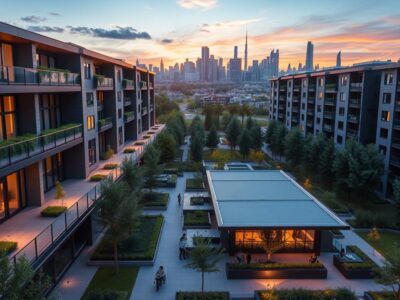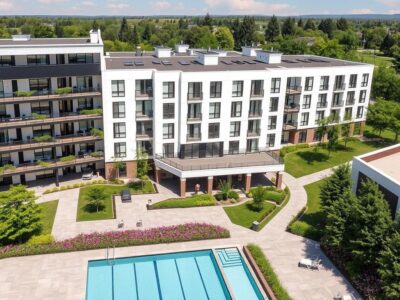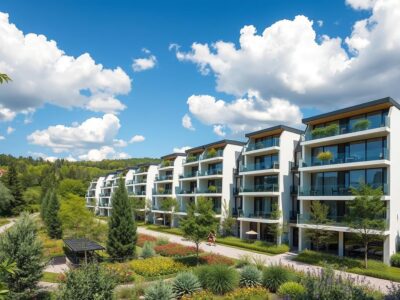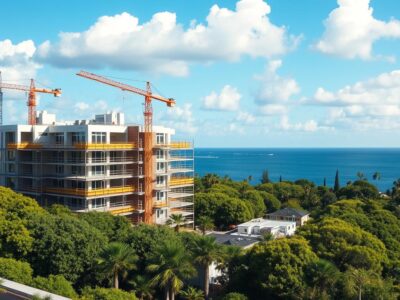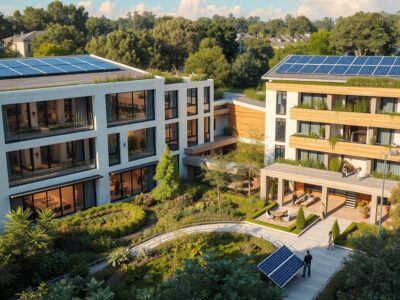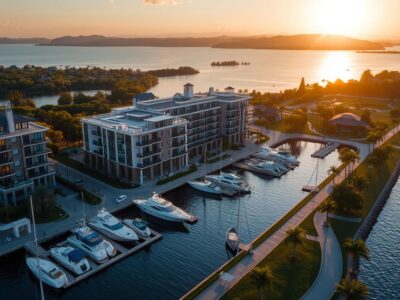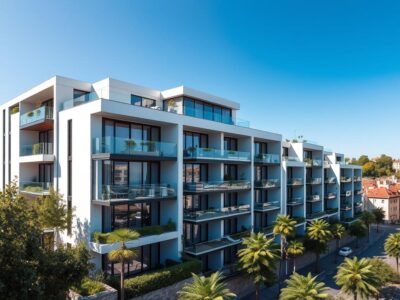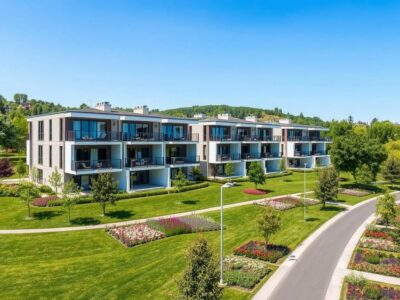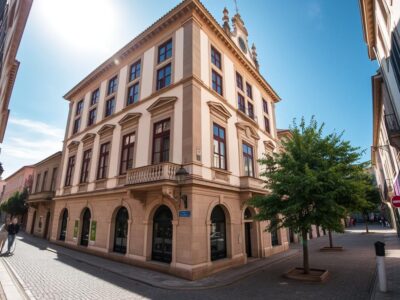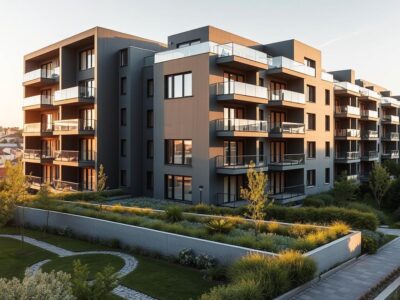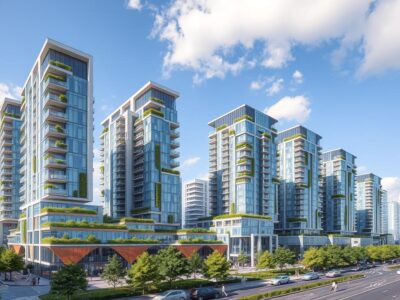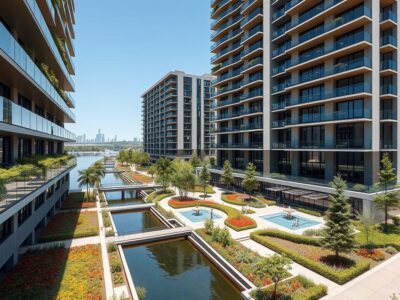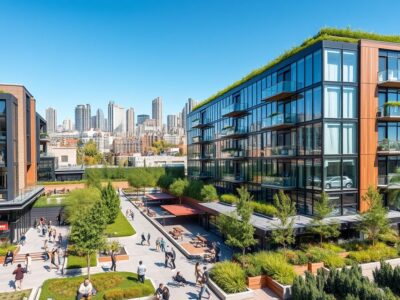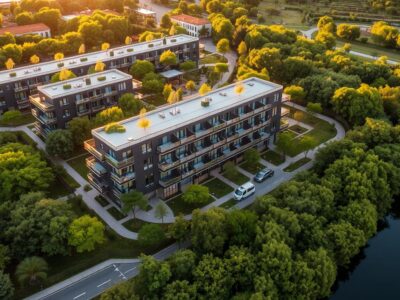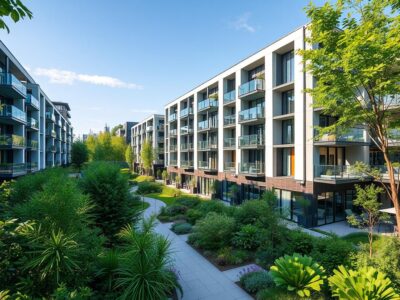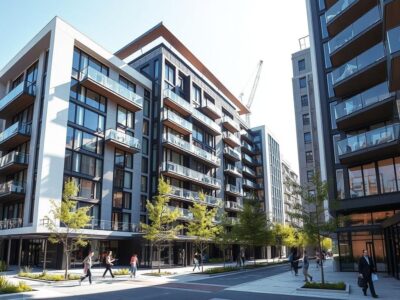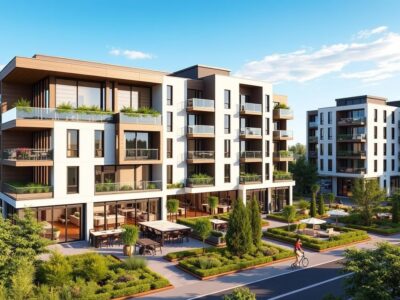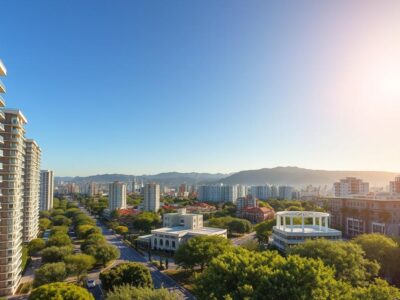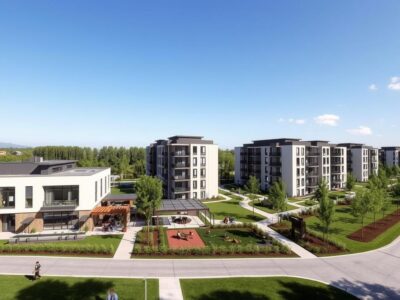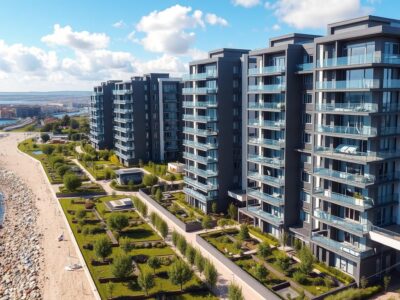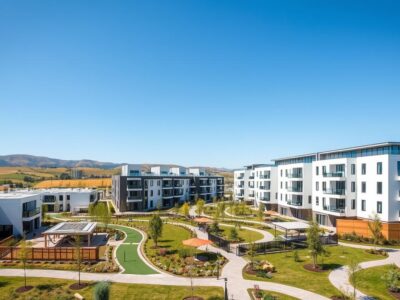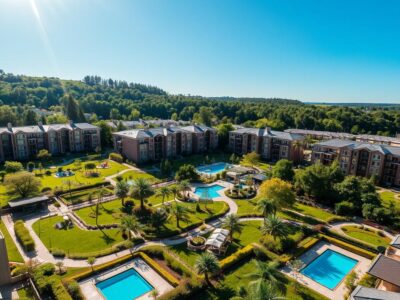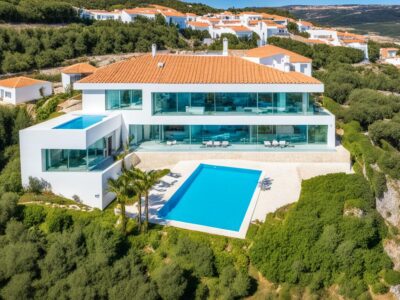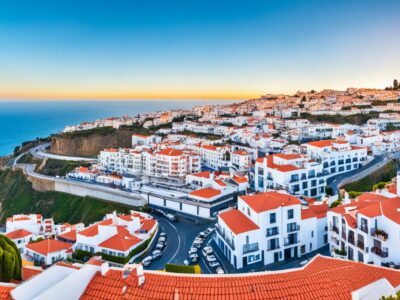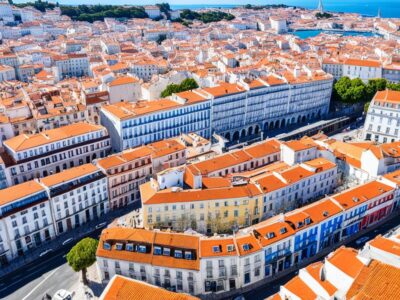Exploring Portugal real estate opportunities has become increasingly attractive for investors worldwide. With property investment in Portugal witnessing a 13.8% price surge in 20211, the market demonstrates a tantalizing blend of tradition and forward-thinking growth. This trend, coupled with projections that Lisbon is set to offer an ROI of 3.4% for long-term rental properties1, positions Portugal as a prime location for those looking for real estate investing in Portugal.
The Portuguese property market is ripe with potential and navigating it requires insight, patience, and a strategic approach. The appeal to invest in Portugal real estate extends beyond mere aesthetics; it’s grounded in robust financial performance and a growing international profile. To make the most of these promising dynamics, an understanding of the nuances and opportunities is essential.
https://www.youtube.com/watch?v=VEY4c_qDUgQ
Key Takeaways
- Portugal’s real estate sector shows a strong recovery with a significant price rise1.
- Lisbon presents compelling ROI for long-term rental investments1.
- Understanding market trends is crucial for successful property investment in Portugal.
- Investing in Portugal requires a strategic combination of patience and insightful decision-making.
- Cultivating an understanding of local property laws and investment incentives is invaluable.
The Allure of Portugal’s Real Estate Market
The Portugal real estate market shines as a beacon for savvy investors, offering a compelling blend of investment benefits and an enchanting lifestyle. With its cultural charm and a consistent tourism growth, the market continues to deliver notable opportunities for both residential properties and commercial investments23.
Capitalizing on Cultural Charm and Tourism Growth
Portugal’s cultural charm is not just a delightful attraction for tourists, but an underlying asset that bolsters the value of its real estate market. The synergy of historical cities, stunning landscapes, and a warm climate has contributed to Portugal’s steady tourism growth, creating a demand for distinctive properties. Evidenced by a surge in Golden Visa applications from countries including India, the US, China, the Middle East, and the UK, the lure of Portugal’s lifestyle and benefits such as visa-free access to the Schengen zone have not gone unnoticed2.
The market’s allure is amplified by the economic incentives offered through investment programs, like the Golden Visa, which allows not only residency but also a path to EU Citizenship after five years for non-EU citizens2.
Understanding Market Trends and Investment Benefits
Investing in Portugal is attractive for several reasons, including the non-habitual resident (NHR) program, which since 2009, has been offering tax optimizations for investors2. The market trends in Portugal demonstrate resilience with a booming real estate sector, displaying an annual appreciation rate of eight percent and even higher in sought-after locations like Madeira Island2. These trends underpin the investment benefits, as investors are encouraged to direct capital toward growing markets with significant upside potential.
Moreover, recent program reforms focus on guiding investments into areas that offer the most value, such as Beja and Guarda for residential investments, and the commercial hubs of Lisbon and Porto for commercial ventures, with investments starting at €350,000 for commercial units2.
Residential Properties Versus Commercial Investments
Distinguishing between residential properties and commercial investments is crucial in Portuguese real estate. While residential properties in interior regions are now the focus of new investor attention, commercial investments in places like Lisbon and Porto remain ever-appealing with options starting at higher investment thresholds of €500,0002. This strategic orientation ensures a balance in the market, while addressing demand and enabling investment in regions ripe for development.
Choices between the two are influenced by individual investor goals, the market’s continuous dynamism, and governmental shifts in investment foci that aim to stimulate economic diversification and sustainability across the country.
| Investment Type | Minimum Investment | Locations | Notable Benefits |
|---|---|---|---|
| Residential Properties | €280,000 | Interior regions like Beja, Guarda | Access to EU Citizenship after five years |
| Commercial Investments | €350,000 | Coastal areas, Lisbon, Porto | High appreciation potential, title deed investment security |
Key Factors Driving Investment in Portugal Real Estate
Property investment in Portugal has become increasingly attractive due to a confluence of investment factors and government initiatives that promote an environment conducive to economic development. The real estate market in Portugal has been bolstered by the country’s pre-pandemic economic growth, as evidenced by the first-ever budget surplus recorded in 2019, which set a positive tone for investment prospects4.
However, the Portuguese economy did experience a contraction of 7.6% in 2020 as a direct result of the COVID-19 pandemic4. Despite this challenge, government initiatives have been pivotal in instilling confidence amongst investors. Notably, public debt increased to 133.7% of GDP, up from 117.7% in 2019, which represents a responsive adjustment aimed at recovering and stabilizing the economy4. Furthermore, with an eye towards future prosperity, Portugal is expected to receive approximately €14 billion in EU grants between 2021 and 2026, funds that are anticipated to further bolster the real estate sector4.
Another critical element influencing the market of real estate investing in Portugal is the country’s robust immigration programs. These policies facilitate not only the influx of new residents but also attract foreign direct investment. The Transparency International’s Corruption Perceptions Index, which ranked Portugal 33 out of 175 countries in 2020, complements the perception of a transparent and legalistic framework for business operations4. Coupled with its rank of 39 out of 190 countries in the World Bank’s Doing Business Report, Portugal shows a track record of reliable business practices that appeal to international investors4.
- Economic Recovery Post-Pandemic
- EU Grants and Economic Support
- Government Initiatives for Business
- Immigration Programs Attracting Global Talent
The Portugal real estate market also capitalizes on the nation’s strategic trade relationships, with primary trading partners like Spain, France, Germany, the United Kingdom, and the United States playing significant roles4. In fact, U.S. foreign direct investment in Portugal reached an impressive USD 2.4 billion in 2019, signaling robust international confidence in the Portuguese economy and its growth potential4. Portugal’s GNI per capita, which stood at USD 23,200 in 2019, further underlines the country’s economic stability and potential for real estate investment return4.
Below is a comparative overview of Portugal’s key economic indicators:
| Economic Indicator | 2019 | 2020 |
|---|---|---|
| Budget Balance | Surplus | Deficit |
| GDP Growth | Positive | -7.6% |
| Public Debt (% of GDP) | 117.7% | 133.7% |
| Unemployment Rate | 6.5% | 6.8% |
| EU Grants (2021-2026) | N/A | €14 billion |

In conclusion, economic growth, beneficial government initiatives, well-managed immigration programs, and strategic international partnerships are reshaping Portugal’s investment landscape. These factors collectively present compelling reasons to consider Portugal’s real estate market as a cornerstone for diversified investment portfolios.
Invest in Portugal Real Estate: Navigating the Current Market
For those looking to diversify their portfolio through property acquisition, navigating the real estate market in Portugal requires a blend of savvy investment strategies and stringent risk management. With the Portugal Golden Visa programme’s inception in 2012 following the financial crisis, an increasing number of high-net-worth individuals have recognized the value of investing in a stable and welcoming economy2.

Effective due diligence is paramount and should encompass aspects such as visa-free access to 26 Schengen countries and the chance at EU Citizenship after five years—enticing benefits that heighten the program’s appeal2. With investment thresholds beginning at €280,000, dedicating time to understand all legal and financial prerequisites can yield significant long-term rewards2.
In light of the global instability from occurrences like the COVID-19 pandemic and geopolitical tensions, demand for the Golden Visa has not dwindled but instead experienced a surge, particularly from countries like the United States and the UK2. This interest is further buoyed by Portugal’s booming real estate market, which sees appreciation rates averaging at eight percent annually2, offering impressive growth potential for investors.
Investors’ appetites have also been redirected towards Madeira Island, where the real estate appreciation rate approaches a stunning 10 percent2. Meanwhile, recent shifts in investment rules spotlight regions like Beja and Guarda, steering investors towards the interior to exploit untapped market potential2. Yet for those with a preference for urban investments, Lisbon and Porto present opportunities in commercial units starting from €350,000, creating a diverse array of options to fit varying investment objectives2.
Highlighting Portugal’s distinctive suite of incentives, the non-habitual resident tax programme establishes itself as a cornerstone for investor tax optimization since its introduction in 20092. When combined with the country’s reputation for political stability, high-quality healthcare, and safety ranking, Portugal emerges as a top-tier destination for real estate investors looking for both security and profitability2.
It is clear that with the right guidance and careful planning, investments in Portuguese real estate can be both prosperous and secure. Conducting thorough market analysis and aligning with trusted local expertise are steps that cannot be overlooked in the journey towards successful property investment in Portugal.
Analyzing the Impact of Government Policies on Real Estate Investments
An overview of recent policy shifts demonstrates the profound impact government strategies can have on the real estate market, with ripple effects touching both international investors and local property owners. As the Portuguese government reviews property taxation and short-term rental regulations, investors must reassess their approaches, seeking avenues for sustainable profitability under the new paradigm.
Strategies Following the Changes in the Golden Visa Program
The Golden Visa Program has been instrumental in attracting international capital to Portugal’s real estate sector. With recent alterations to the program aimed at channeling investments away from urban hotspots to low-density regions, investors are now exploring emerging markets within the country. Navigation through these regulation changes5 demands thorough understanding and strategic adjustment to remain competitive and ensure return on investment.
Adapting to the New Regulations in Short-term Rentals
Simultaneously, in alignment with government policies to regulate the housing market, new rules affecting short-term rentals have been introduced. These regulatory updates necessitate agile adaptation from investors focused on the burgeoning tourism-driven rental sector, underscoring the importance of comprehensive market analysis and contingency planning in securing real estate investments in Portugal.
Understanding the interplay between international transactions and local housing policies becomes paramount as stakeholders seek to optimize their portfolios amidst changing government policies6. Integrating recent data and market predictions, investors can discern not just the immediate implications of these changes but anticipate future trends, securing their foothold in a dynamic environment.
FAQ
Can foreigners invest in real estate in Portugal?
Is Portugal a profitable destination for real estate investment?
What are the benefits of investing in Portuguese real estate?
Should I invest in residential properties or commercial real estate in Portugal?
What are the key factors driving investment in Portugal's real estate market?
How can I navigate the current real estate market in Portugal?
How have government policies impacted real estate investments in Portugal?
Source Links
- https://www.mondaq.com/property-taxes/1385604/the-return-on-investment-of-real-estate-in-spain-portugal-and-belgium-where-should-you-invest-your-500k
- https://www.worldfinance.com/wealth-management/portugal-offers-exciting-opportunities-for-investors
- https://go.gale.com/ps/i.do?id=GALE|A769112504&sid=sitemap&v=2.1&it=r&p=AONE&sw=w
- https://www.state.gov/reports/2021-investment-climate-statements/portugal/
- https://taxfoundation.org/blog/portugal-property-tax-transfer-tax-reform/
- https://www.nar.realtor/research-and-statistics/research-reports/international-transactions-in-u-s-residential-real-estate









